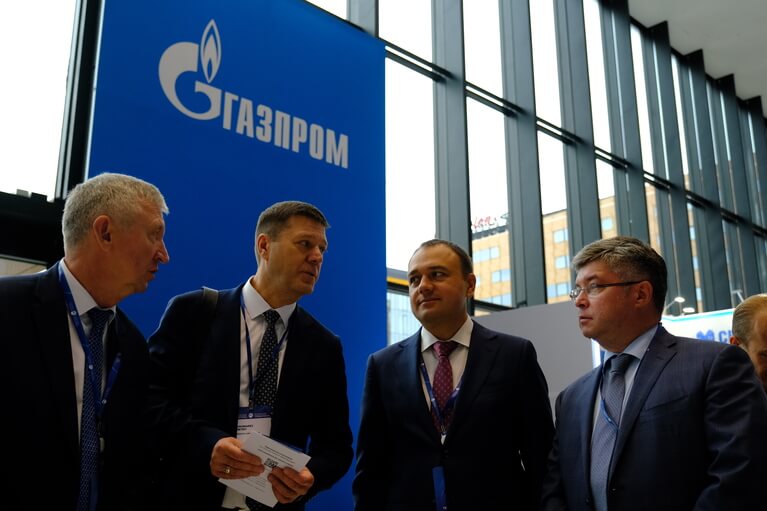
Day 1 of the 11th St. Petersburg International Gas Forum is over. During 25 conferences, round table discussions, seminars, and panel sessions the participants and delegates of the Forum shared their experience of operation during the crisis, made forecasts about future development of the global gas market, and talked about new technologies and solutions.
Despite the unprecedented sanctions, oil recovery in Russia increased by 3% during the first 8 months of 2022. This impressive result is the effect of the Russian oil companies swiftly having refocused their export from the West to the East – offering discounts to new buyers, as Dmitry Pigarev, Deputy Director of the Economic Forecasting Centre, Gazprombank, announced during the conference ‘Solutions by Gazprombank Group for suppliers and contractors of the oil and gas industry’. At the same time, a reduction of 9% was registered in the gas industry, but the analysts are sure that it will be made up by ‘huge prices’ in the short run. According to Dmitry Pigarev, ‘export amounts to EU countries we’ve lost’ can be replaced with supplies to the East in the next few years.
Prospects of liquefied gases use were also discussed by the participants of the round table discussion ‘Liquefied gases: their share and place in Russia’s social gasification program implementation’. The speakers outlined that in their opinion liquefied gases, including both LNG and hydrocarbon gases, can become the basis of the so-called alternative social gasification, which implies gas supply to citizens residing in underpopulated and/or remote regions. Today, liquefied natural gas is the prioritized fuel type for alternative gasification, said Nikolay Storonsky, CEO of Gazprom Promgaz. Switching to this fuel is pertinent not only for alternative gasification ambassadors, which are regions of the Far Eastern Federal Territory, but for the Moscow Region, too. Thus, Mosoblgaz, which is responsible for gasification of the densely populated Moscow Region, considers switching 37 thousand landed estates to LNG – those located in remote or underpopulated villages. According to estimates of Igor Baranov, CEO of the company, it can result in the region consuming about 750 thous. m3 of liquefied gas a year.
At the same time, Yuri Vazhenin, Vice President of the Russian Gas Society noticed that in the current situation getting back to discussion of alternative gasification, including the LPG-based, sounds quite reasonable. ‘Today, prices for liquefied petroleum gas are going down because of its excess production, as traditional LPG consumers – Poland and Ukraine – abandoned Russian supplies for reasons well-known,’ Yuri Vazhenin explained. He believes that development of alternative LPG based gasification could work in case government contracts for 5% of liquefied propane and butane produced that used to be in place in the USSR would be restored. This would provide enough of this type of fuel for consumers.
Another important subject that was discussed on September 14 at the Forum was associated with the prospects of Russian technologies and their introduction in the fuel and energy sector. It is quite obvious that these processes need to be accelerated, but there are certain challenges. It is associated with demand forecasting and absence of scaling specialists – this is what participants of the session ‘New technology vectors in oil and gases conversion to basic petroleum products and feedstock for further procession’ said. ‘To make things go commercial it is essential to understand the niche for its application at the concept stage. This is challenging, as firstly research and development works can take from 2 to 5 years, and the idea can become irrelevant during this period of time. Secondly, today companies are concentrated on substitution of technologies that are currently unavailable, and we have got no information about the limits of the planning horizons,’ resumed Alexey Rodikov, Deputy CEO of Engineering and Commercialization, Gazpromneft-Industrial Innovations. While talking about the technologies required by oil and gas companies the participants of the discussion made a pointed reference to the ones that help derive petrochemicals from hydrocarbons mined, as well as biotechnologies.
Those who participated in the events of SPIGF 2022 Day 1 were especially interested in Gazprom Pererabotka’s experience of production facilities upgrade in the Nadym-Pur-Tazovsky Region – the insight into the matter was presented at the research-to-practice conference ‘Gas processing and gas conversion: growth points’. The upgrade resulted in 717 new work places, and it also increased the revenue from hydrocarbon feedstock transportation and procession services by 14 bln rubles, minimized CO2 emissions, and enabled switching to Russian software.
Despite all the challenges the Russian oil and gas sector encounters today it can manage keeping its top position in the global arena in the long run. With a single heart, participants of the conference ‘Social responsibility of the oil and gas business: energy transition, ecology, link of generations’ agreed with that. Energy transition, implying highest possible rejection of conventional fuels in favor of the alternative ones, which the European community supports so much, will not weaken Russia in the global hydrocarbon market. Traditional energy media are still in demand – both in Europe and developing economies, and that is why Russia should invest into hydrocarbon production increase, said Alexey Kontorovich, Academic Advisor at the Trophimuk Petroleum Geology and Geophysics Institute (the Siberian Branch of Russian Academy of Sciences). Viktoria Fedorova, Senior Teacher at the Gubkin Russian State University of Oil and Gas reminded the participants that is had never been the case that ‘consumption of conventional energy sources was reduced because of energy transition.’ Her resume was that ‘regardless of renewable energy sources introduction, neither oil nor gas consumption will be reduced.’
Besides all the interesting discussions, Day 1 stood out with several remarkable agreements about new technologies signed.